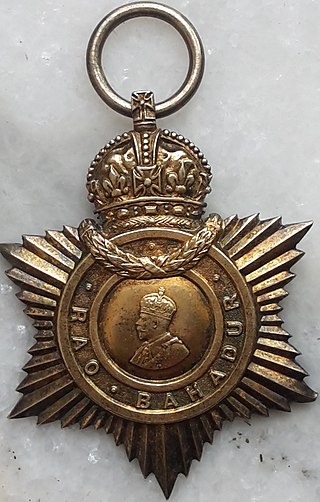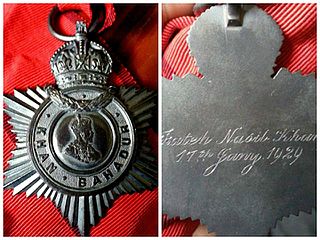
Tamil Muslims are Tamils who practise Islam. The community is 6 million in India, primarily in the state of Tamil Nadu where 90% of the Muslim community identified themselves as Tamils. In Tamil Nadu, the majority of Tamil-speaking Muslims belong to the Rowthers Community while other Muslims live in coastal Tamil Nadu. There is a substantial diaspora, particularly in Southeast Asia, which has seen their presence as early as the 13th century. In the late 20th century, the diaspora expanded to Western Europe, Persian Gulf and North America.

George Yule was a Scottish merchant in England and India who served as the fourth President of the Indian National Congress in 1888 at Allahabad, the first non-Indian to hold that office. He was founder of George Yule & Co. of London, and headed Andrew Yule & Co., of Calcutta. He served as Sheriff of Calcutta and President of Bengal Chamber of Commerce.

Rao Bahadur and Rai Bahadur, abbreviatedR.B., was a title of honour bestowed during British rule in India to individuals for outstanding service or acts of public welfare to the Empire. From 1911, the title was accompanied by a medal called a Title Badge. Translated, Rao means "King", and Bahadur means "Brave". Bestowed mainly on Hindus, the equivalent title for Muslim and Parsi subjects was Khan Bahadur. For Sikhs it was Sardar Bahadur.

The Imperial Legislative Council (ILC) was the legislature of British India from 1861 to 1947. It was established under the Government of India Act 1853 by providing for the addition of six additional members to the Governor General Council for legislative purposes. Thus, the act separated the legislative and executive functions of the council and it was this body within the Governor General's Council which came to known as the Indian/Central Legislative Council. In 1861 it was renamed as Imperial Legislative Council and the strength was increased.
Bombay Legislative Council was the legislature of the Bombay Province and later the upper house of the bicameral legislature of Bombay Province in British India and the Indian state of Bombay.
The Karachi Chamber of Commerce and Industry (KCCI) is the Chamber of Commerce for Karachi, Pakistan.

The Council of State was the upper house of the legislature for British India created by the Government of India Act 1919 from the old Imperial Legislative Council, implementing the Montagu–Chelmsford Reforms. The Central Legislative Assembly was the lower house.

M. Muhammad Ismail Rowther Sahib was an Indian politician and social worker from southern Indian state Tamil Nadu. he was a founder of the Indian Union Muslim League party after the partition of British India. He was popularly known in Tamil Nadu and Kerala as the "Quaid-e-Millat". Ismail was a member of Madras Legislative Assembly and Leader of the Opposition (1946—52). He was also a member (1948—50) of the Constituent Assembly, the drafting body of the constitution of India. He was also a member of Rajya Sabha (1952—58) and Lok Sabha.
Khan Bahadur Mohammed Abdul Kuddus Badsha Sahib was an Indian merchant, politician and philanthropist of the Madras Presidency. He was also one of the founders of the Indian Bank.
General elections were held in British India in November 1923 for both the Central Legislative Assembly and Provincial Assemblies. The Central Legislative Assembly had 145 seats, of which 105 were elected by the public.

General elections were held in British India between 28 October and late November 1926 to elect members of the Imperial Legislative Council and the Provincial Legislative Councils.
General elections were held in British India in September 1930. They were boycotted by the Indian National Congress and marked by public apathy. The newly elected Central Legislative Assembly met for the first time on 14 January 1931.
Manubhai Shah was an Indian politician who played an important political and developmental role in independent India for over half a century. He was the inugural minister of Ministry of Heavy Industries.

Vellore Madhavan Muralidharan, popularly known as Mike Muralidharan, is an Indian educationist and IT industry veteran. He is the Chairman of Ethiraj College for Women, the Chief Operating Officer of Bahwan CyberTek Group and the Chairman of ALERT NGO. He is a distinguished alumnus of the College of Engineering, Guindy.
T. E. Vasudevan was an Indian film producer, who worked mainly in Malayalam cinema. He is the first ever winner of the J. C. Daniel Award, Kerala government's highest honour for contributions to Malayalam cinema, which he received in 1992.
The New Year Honours 1921 were appointments by King George V to various orders and honours to reward and highlight good works by members of the British Empire. They were published on 31 December 1920.

Khan Bahadur – a compound of Khan "Leader" and Bahadur "Brave" – was a honorary title in British India conferred on Indian subjects who were adherents of Islam or Zoroastrianism. The equivalent title for Hindus, Buddhists and Indian Christians was Rao Bahadur/Rai Bahadur and Sardar Bahadur for Sikhs. The title of Khan Bahadur was one degree higher than the title of Khan Sahib.

A. M. M. Murugappa Chettiar was an Indian industrialist who served as the first Indian President of the Madras Chamber of Commerce and Industry. He is the founder of Murugappa Group.
N. M. Wagle is a former Indian civil servant, business executive and a former Managing Director of Greaves Cotton Ltd., Chairman of Crompton Greaves Ltd.,. He headed the City and Industrial Development Corporation (CIDCO), a Maharashtra Government agency, for five consecutive terms (1970–75), becoming the longest serving chairman in the institution's history. He was the first Indian to serve as the president of the Associated Chambers of Commerce and Industry of India (ASSOCHAM), one of the premier trade organizations in India. He also served as the president of the Bombay Chamber of Commerce and Industry for two terms, in 1961 and 1968. The Government of India awarded him the third highest civilian honour of the Padma Bhushan, in 1970, for his contributions to Indian industry.
Sohrab Pirojsha Godrej, popularly known as Soli, was an Indian businessperson, entrepreneur and the chairman of Godrej Group, one of the largest conglomerates in India with interests in real estate, consumer products, industrial engineering, appliances, furniture, security and agricultural products. He is a former Sheriff of Mumbai.









